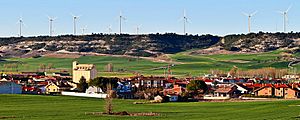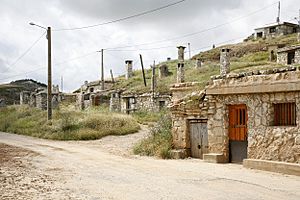Baltanás facts for kids
Quick facts for kids
Baltanás
|
|||
|---|---|---|---|
 |
|||
|
|||
| Country | |||
| Autonomous community | |||
| Province | |||
| Municipality | Baltanás | ||
| Area | |||
| • Total | 158.85 km2 (61.33 sq mi) | ||
| Elevation | 780 m (2,560 ft) | ||
| Population
(2018)
|
|||
| • Total | 1,216 | ||
| • Density | 7.655/km2 (19.826/sq mi) | ||
| Time zone | UTC+1 (CET) | ||
| • Summer (DST) | UTC+2 (CEST) | ||
| Website | www.baltanas.es | ||
Baltanás is a town located in the province of Palencia, in the Castile and León region of Spain. In 2021, about 1,219 people lived there.
Contents
What's in a Name? The Story of Baltanás
The name Baltanás comes from "Valle de Atanasio," which means "Atanasio Valley." A long time ago, around the year 1135, during the rule of King Alfonso VII, it was called "Valle de Valtanás." By 1145, the word "valley" was dropped. Over time, the "V" at the beginning changed to a "B," giving us the name "Baltanás" we use today.
A Glimpse into Baltanás's Past
Before the Spanish Civil War, Baltanás had about 3,000 residents. The population decreased quite a bit during that time. In the 1950s, fewer people lived there due to a lack of jobs and food.
Baltanás is still an important place for services in the El Cerrato area. It is located along the main highway between Aranda de Duero and Palencia. The Catholic Monarchs (King Ferdinand and Queen Isabella) once named Baltanás the main town of the Cerrato region. It is still known as the historic capital of El Cerrato.
Exploring Baltanás: Geography and Buildings
Baltanás covers an area of about 158.85 square kilometers (about 61 square miles). It is the historic capital of the El Cerrato region, found in the southeast part of the Palencia province. The land here has been shaped by rivers, creating many hills and flat areas called moors. The weather in Baltanás is "continental." This means it has very hot summers and very cold winters.
Most of the buildings in Baltanás are single-family homes with one or two floors. They are built close together, forming blocks. The town has many squares, and the most important one is Plaza de España. This is where the town hall is located. Baltanás also has parks, with the largest one called La Carolina.
Unique Underground Wineries
One of the most interesting things in Baltanás is its collection of underground wineries. These are 374 cellars dug into a hill called Cerro del Castillo. People have traditionally made and stored wine here for a very long time.
It is said that the famous Spanish architect Antoni Gaudí visited Baltanás. Some believe he was inspired by these unique cellars when he designed the chimneys for his famous building, La Pedrera, in Barcelona.
Images for kids
See also
 In Spanish: Baltanás para niños
In Spanish: Baltanás para niños
 | Lonnie Johnson |
 | Granville Woods |
 | Lewis Howard Latimer |
 | James West |


















